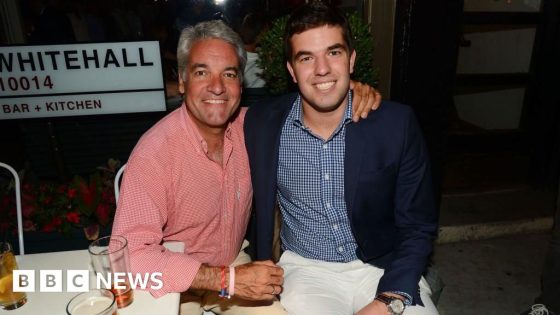Jul. 14—He was a chiseled DJ with rugged good looks.
She was a medical entrepreneur who could have passed for a model or actress.
They met, fell in business, made millions, bought a Scottsdale mansion.
On Feb. 25, the apparently perfect Scottsdale power couple married at a “Jeff & Lexie Celebrating Our Love” formal attire ceremony at the Wrigley Mansion.
On June 17, either prepared for a hard-earned honeymoon or ready to run, they waited to board a London flight, adjusting lavish jewelry and $30,000 watches.
They walked out of Phoenix Sky Harbor International Airport in handcuffs.
According to a federal indictment, “Alexandra Gehrke and Jeffrey King were charged for targeting elderly Medicare patients, many of whom were terminally ill in hospice care, for medically unnecessary wound grafts.”
Gehrke — known to friends and associates as “Lexie” — and King allegedly filed $900 million in fraudulent claims, pocketing “$330 million in illegal kickbacks as a result of their fraudulent scheme.”
According to the indictment, they were responsible for “allograft” bandages being applied frivolously to hundreds of patients, many of them dying.
According to Gehrke’s LinkedIn profile, “APEX Medical is a national medical device distribution company.
“We are a federally registered SDVOSB (Service-Disabled Veteran-Owned Small Business) headquartered in Phoenix, Arizona. We provide the highest quality advanced products to our physicians directly resulting in superior outcomes.
“Together, with our partners, we help heal patients faster.”
Lies, the government argues.
Rather than needed skin grafts, the Scottsdale duo allegedly was skinning the government through a complex billing graft.
On June 28, U.S. Attorney Gary M. Restaino announced criminal charges against Gehrke, 38, and King, 49, for “schemes to defraud Medicare and Medicaid.”
The government summarizes the actions of the Scottsdale newlyweds as “a complex web of lies and deceit.”
If the U.S. attorney’s office proves its case, the glam couple has seen the last of an ostentatious lifestyle.
“Gehrke faces a combined statutory maximum penalty of 85 years, and King faces a combined statutory maximum penalty of 75 years,” according the indictment.
Thanks to potential sentencing “enhancements,” it only gets worse: “the advisory guidelines range under the U.S. Sentencing Guidelines is a life sentence for both defendants.”
Last week, in the first skirmishes of what likely will be a long court battle, attorneys for Gehrke and King insisted they should be released on bail pending their trials.
Both lost.
The charges
Gehrke and King are charged with “targeting elderly Medicare patients, many of whom were terminally ill in hospice care, for medically unnecessary wound grafts,” according to a press release.
“Medicare and other health care benefit programs paid over $600 million based on the false and fraudulent claims they submitted for these vulnerable beneficiaries.”
One of the defense attorneys sneered at what he called an overblown case, calling the press release “fish wrap.”
Shane Butland of the U.S. Attorney’s Office told a federal judge last week the government has several “cooperating witnesses.”
The Scottsdale couple “pressured nurse practitioners” to apply unnecessary wound grafts, Butland said.
One of those cooperating witnesses could be Bethany Jameson, 53, of Gilbert.
Jameson was paid $230,000 by Gehrke/King companies Apex Mobile Medical and APX “to apply medically unnecessary allografts to Medicare beneficiaries that were procured through kickbacks and bribes,” the government alleges.
“Between November 2022 and August 2023, Apex Mobile Medical and APX billed Medicare over $71 million for allografts applied by Jameson. Medicare paid over $49 million based on those false and fraudulent claims.”
Jameson has a plea hearing scheduled for Aug. 14.
Massive seizure
Last week, the federal government seized a long list of property belonging to Gehrke-King, including:
—A four-bedroom, six-bathroom, 5,200 square feet mansion at 6246 E. Hillcrest Blvd. the couple bought in January for $5.7 million. Five minutes from Old Town, the lavish home backs against Camelback Mountain.
—A smaller home in Tempe, valued at $700,000.
—A 2016 Ferrari Spider, which sells for around $300,000.
—A $200,000 2023 Mercedes-Benz AMG SL63.
—A $175,00 2022 Mercedes-Benz AMG G63.
—A $50,000 2023 Mercedes-Benz GLE-Class.
—A watch valued at $30,000.
—A watch valued at $50,000.
—Gold bars, coins and jewelry with an estimated value of $525,000.
But wait, there’s more — much more:
“On June 18, 2024, law enforcement seized over $52 million from Gerhke’s personal and business accounts the day after Gehrke’s arrest,” a court document states.
And a search warrant raked in $350,000 in cash from safe deposit boxes.
“This large amount of cash could easily have been used to flee and live comfortably without leaving traces,” prosecutors alleged.
The feds say the couple has been scrambling to hide money.
Gehrke held accounts in eight different financial institutions under her name and six different LLCs.
The government alleges in two days in May, Gehrke transferred $30 million into new accounts.
“The lack of a legitimate financial purpose in moving money in this manner suggests that these transfers were intended to conceal the assets,” the U.S. attorney’s office claims.
Ditto, the government alleges, for King — who withdrew nearly $7 million from various accounts in April.
The Scottsdale duo “likely have access to significant fraud proceeds, possibly tens of millions of dollars, that the government has yet to trace and seize,” according to court documents.
Vacant mansion
Early last week, a FedEx package lay on the doorstep of a $6 million home overlooking Camelback Mountain.
No one was home to collect the package, as Gehrke and King — the mansion owners — were in separate cells at Florence Correctional Center 60 miles away.
While the two were initially charged together, the cases have been split.
Gehrke is now represented by Joshua Sabert Lowther, an Atlanta attorney. His website promises “aggressive and innovative representation” and “powerful legal defense for all types of federal crimes.”
Wearing a multi-colored bow tie, blue suit, dark shoes and pink socks, Lowther argued for Gehrke’s release July 8 in front of federal U.S. District Court Judge Deborah Fine.
A pair of hulking U.S. marshals escorted a handcuffed Gehrke into the downtown courtroom.
In stark contrast to the trendy outfits of her social media posts, Gehrke was wearing a bleak red prison jumpsuit.
As Fine called the detention hearing to order, Gehrke grimaced in apparent disbelief as Butland laid out his case against releasing her.
Describing it as instructions to a housekeeper or close associate, Butland introduced as evidence a hand-written note found at the Scottsdale mansion, concluding with the line:
“Please notify of any ideitment (sic) or any further harsher legal escalations immediately.”
Butland pointed to hundreds of thousands of dollars in cash and gold bars, plus millions in cryptocurrency.
“If released, (Gehrke) could access this money and use it to flee and live comfortably as a fugitive,” Butland argued.
Two books showed Gehrke’s intentions, the prosecutor added.
One was found at her home: “How To Disappear: Erase Your Digital Footprint, Leave False Trails, and Vanish Without a Trace.”
Then there was the book in her carry-on bag: “Criminal Law Handbook: Know Your Rights, Survive The System.”
“This is not the type of book ordinarily brought on a 36-day European vacation,” Butland said, with a mocking tone.
In addition to a note with codes on how to cash or transfer cryptocurrency, Butland introduced a photo of a folder.
Inside, the prosecutor said, were extensive notes Gehrke wrote, with instructions to transfer money to a Swiss bank — and calculations on how much it would cost to buy dual citizenship in Malta.
If she obtained Maltese citizenship, the prosecutor warned, Gehrke could become a fugitive and travel Europe freely.
Lowther countered that Gehrke was merely preparing for a long European honeymoon. The books were irrelevant, he said: “This is America. Anyone can read whatever they want.”
The Atlanta-based attorney stressed repeatedly before the judge that the case against Gehrke only sounded dreadful because the government has not released documents and details that can be countered.
Under the presumption of innocence, the defense attorney stressed, Gehrke should be released to help her prepare for the coming trial.
The defense attorney offered Fine several options, including ankle monitoring and “in-home incarceration” at her mother’s Tempe home.
The prosecutor said Gehrke gave her mother the house — and paid her more than $1 million as part of the fraudulent business.
“A preponderance of evidence shows (Gehrke) is a serious flight risk — no bail could secure her appearance,” Fine concluded, denying bail.
King denied
The next day, two courtrooms down inside the same Sandra Day O’Connor U.S. Courthouse, Butland repeated much of what he said about Gehrke’s heinous crimes and near-certainty of running away.
This time, he was targeting her new husband, King.
Scottsdale attorney Kurt Michael Altman, who originally represented both parties when they were charged June 18, sat next to King.
Wearing glasses, his head shaved, the shackled King was expressionless as Butland told U.S. Judge Alison Bachus about King’s role in “a massive and sophisticated fraud.”
After running through King’s alleged preparations to “live a life of luxury as a fugitive,” Butland told the judge “no conditions can insure his return to court.”
Altman took exception to the description of his client.
“The government repeatedly lumped Mr. King and his co-defendant together when convenient and spun the evidence and events … for the government’s purposes,” Altman insisted in a filing.
In the courtroom, the attorney pointed to friends and family members — including one of King’s adult children — who were in the courtroom, countering that King has every incentive to stay and fight his case.
Altman said the only reason King recently withdrew millions is that “Chase Bank told him to — they said ‘we don’t want your money’ … they probably got a subpoena,” Altman said.
Altman pointed to King’s military service and his status as a disabled veteran. Keeping him in prison would deny him access to medical care — as well as trial preparation, Altman argued.
The defense attorney said King had never been arrested before and owns the Scottsdale Music Company, where he would return to work, if released.
The judge was not convinced.
Bachus ruled King — like his wife — must remain in prison until his trial.
As the King and Gehrke defense attorneys will point out, the government has a long way to go to prove those allegations.
Trials have not been scheduled and are likely at least months away
But a hint at one half of the couple’s strategy may have been dropped at King’s detention hearing.
After Altman insisted that the government did not link any of the books or notes with instructions to King, Butland said King — via his attorney — “is essentially pointing the finger at his co-defendant.”
Source Agencies



